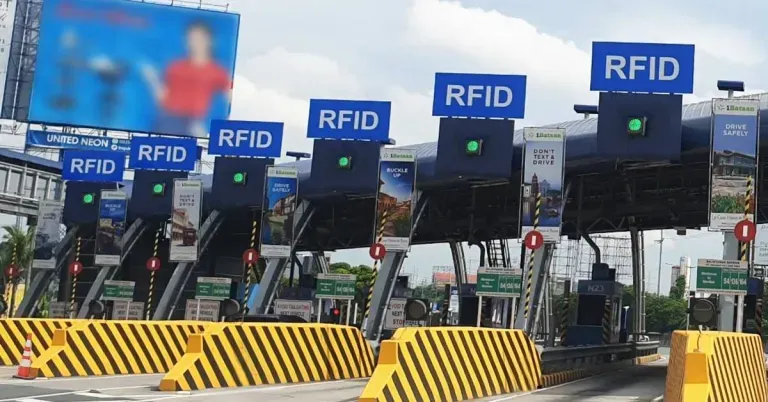Our favourite places to stay on this sleepy Cebu island.
RFID Fine Postponed Until 2025: What Motorists Need to Know

The Department of Transportation (DOTr) has officially announced that the RFID fine is postponed until 2025, allowing more time for the system to be fully optimised. This decision, announced by the Presidential Communications Office (PCO) on 22 Sep 2024, was made to align with President Ferdinand Marcos Jr.'s goal to reduce traffic and improve road systems across Metro Manila and nearby regions.
Also read: CAVITEX Cashless Policy: RFID Payments Mandatory Starting September 14
Details on why the RFID fine is postponed until 2025
Initially, penalties for motorists without RFID tags were set to begin on 31 Aug 2024, under Joint Memorandum Circular No. 2024-001. This was later moved to 1 Oct 2024, to give tollway operators and government agencies more time to smooth out operations and conduct public information campaigns. However, the DOTr ultimately decided to delay the enforcement of penalties until 2025.
Why RFID?
The RFID system was introduced to streamline toll transactions and reduce congestion at expressway plazas by making the process entirely cashless. Two separate RFID systems are currently in use: AutoSweep, managed by San Miguel Corporation (SMC), and EasyTrip, overseen by Metro Pacific Tollways Corporation (MPTC). Both operators cover different major expressways throughout the country.
AutoSweep (SMC) operates major roads such as the South Luzon Expressway (SLEX), Skyway, Skyway Stage 3, and Tarlac Pangasinan La Union Expressway (TPLEX).
EasyTrip (MPTC) covers expressways including the North Luzon Expressway (NLEX), Subic Clark Tarlac Expressway (SCTEX), Cavite Laguna Expressway (CALAX), and the Cavite Expressway (CAVITEX).
A major goal of the RFID system is interoperability, allowing one RFID tag to work across all expressways. In fact, since July 2024, motorists have only needed one RFID tag for use on any expressway. The Toll Regulatory Board (TRB) plans to introduce a unified RFID wallet system by October 2024, ensuring that drivers can move seamlessly between AutoSweep and EasyTrip-operated roads. This unified system should eliminate the confusion of separate accounts and make travel more efficient.
Penalties for non-compliance
Once the fines are introduced, motorists driving on expressways without an RFID tag will be penalised ₱1,000 for the first offence, ₱2,000 for the second, and ₱5,000 for subsequent violations. Additionally, drivers exiting with an insufficient RFID balance will face fines starting at ₱500 and escalating to ₱2,500 for repeated offences.
Also read: How to Check RFID Balance: A Step-by-Step Guide for Every Pinoy
While the delay provides some relief, the DOTr emphasises that it’s important for motorists to prepare now by ensuring they have an RFID tag and sufficient balance to avoid future fines. This additional time allows the government to enhance the RFID system and ensure smoother, faster toll transactions for all drivers.
All image credit goes to Easy Trip PH \ Official website
Published at
About Author
Anne Mercado
Subscribe our Newsletter
Get our weekly tips and travel news!
Recommended Articles
10 Bantayan Island Resorts, Hotels, and Rentals for Your Tropical Escape 14 Best Credit Cards for Travel in the Philippines The only plastic we need for travel.
10 Best Mountain Cafes in the Philippines for Your Peak Coffee Experience Coffee date on the mountains, anyone?
10 Family Outing Ideas in Metro Manila Under ₱500 Looking for a weekend bonding with the family under ₱500? Head to these places, pronto!
10 Fun Things to Do in Manila Alone Live your best life in Manila, even when you’re riding solo.
Latest Articles
Mother’s Wonderland: Quezon Province’s Fantasy Theme Park Explore a magical theme park in Tayabas filled with nature, art, and fantasy
Kayangan Lake in Coron, Palawan: Everything You Need to Know Dive into the crystal-clear magic of Kayangan Lake, the crown jewel of Coron, Palawan!
Dingalan Travel Guide: Nature Spots to Discover Now Underrated coastal gem in Aurora
What to Eat in Bicol: Iconic Dishes and Treats, and Unique Pasalubong You’ll Love Spice up your foodie adventure with iconic Bicol dishes and must-try pasalubong!
Top Travel Trends in the Philippines for 2025 New spots, tips, and trends

